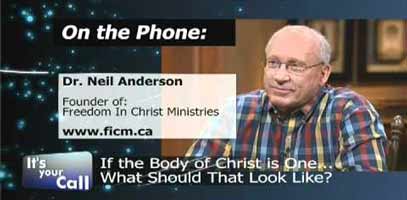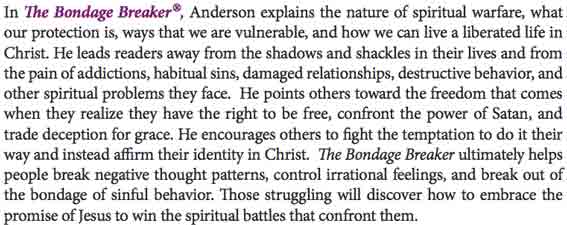KAY ARTHUR OF PRECEPT MINISTRIES INTERNATIONAL AND THE UNCHANGED AND UNCHANGING NEIL ANDERSON
By Ken Silva pastor-teacher on Nov 18, 2012 in Current Issues, Features

After reading About Kay Arthur Of Precept Ministries International the other day, a dear friend as well as a reader of Apprising Ministries for years sent the link to the well-reserached article I’ll reference at the end of this piece by G. Richard Fisher of the fine discernment ministry Personal Freedom Outreach.
You should know that my friend has “taken over 50 Precept Bible classes since 1992” and she has also “completed the 3 day training sessions to be qualified to be a leader.” Though she decided not to teach these Precept classes, she has “taught the Bible in women’s Bible studies in churches for over 17 years.”
So I believe the testimony she shares next is worthy of your attention:
For the most part, Precepts offers a very solid method of Bible teaching/study. But, Kay Arthur has suggested different teachings over the years that are very questionable, i.e., Neil Anderson’s – The Bondage Breaker, Experiencing God by Henry Blackaby, etc.
Having been with Southern Baptist Convention myself since 1988 I have personally been through that course of mystical mythology by Henry Blackaby, who has attained a near apostle-like status within the SBC. Basically, in my experience, when Blackaby speaks on spirituality it is accepted as if he’s on par with Scripture.
Apprising Ministries special correspondent Bob DeWaay does an excellent job in showing you why we should avoid the fables of Blackaby in “Experiencing God” By Henry Blackaby: How Mysticism Misleads Christians:
Blackaby makes personal revelations not only binding (they must be obeyed) and infallible (certain), but he also declares that they are necessary for everyone’s spiritual well-being: “If the Christian does not know when God is speaking, he is in trouble at the heart of his Christian life!” ((Henry T. Blackaby & Claude V. King, Experiencing God (Nashville: Broadman and Holman, 1994), 132.)) Furthermore, he says, “If you have been given a word from God, you must continue in that direction until it comes to pass (even twenty five years like Abraham).” That means that if someone should get one of these “words from God” and if it actually was not from God, he would be obligated to follow whatever foolhardy, insensible path the “word” led him down. Such teaching, in my opinion, is foolish and abusive to the flock.
God physically appeared to Abraham many times as “the angel of the Lord.” Abraham received special revelations. We don’t. We do not have the same certainty that our subjective impressions are “the word of the Lord.” Amazingly, Blackaby sees the problem with his approach but still presses on with it: “If you have not been given a word from God yet you say you have, you stand in judgment as a false prophet . . . [cites Deut. 18:21-22].” ((Ibid., 140.)) EXACTLY! That is the very claim I made in the last issue of CIC. ((HTTP://CICMINISTRY.ORG/COMMENTARY/ISSUE98.HTM)) If these personal words from God are taken as binding, and we speak them to ourselves and they are not totally accurate, we have become false prophets to our own selves. Blackaby evidently agrees, yet he pushes on.
The flaws of Blackaby’s subjectivism are rather obvious when you examine his claims objectively. God’s revealed will is not found by subjective experiences, but in Scripture. Looking around in the world hoping to discover “where God is working” is impossible since God is always working everywhere as He providentially brings history along toward His ultimate purposes. We will be fooled by our own prejudices because we think “God working” must look something like whatever our religious inclinations tell us it will look like.
Furthermore, he has elevated fallible words that may or may not be from God to the level of infallible Scripture and elevated every believer to the status of Moses and Abraham as recipients of special revelation. Following his approach is not how we “experience God.” We cannot not know if we are experiencing God in any way other than to come to Him on His own terms, by faith. When we do, we are assured that God is with us no matter what experiences we have. (source)
Concerning Kay Arthur recommending the work of Neil Anderson, there’s no question that she does. For example, here’s what she says about Anderson’s The Bondage Breakers (TBB):
(source)
Then on the back cover of Anderson’s Victory Over the Darkness we read:
As far as Anderson’s TBB itself we’re told:
(source)
Against this backdrop I now point you to G. Richard Fisher’s Demons, Demons, Where Are The Demons? The Unchanged And Unchanging Neil Anderson where he informs us:
Criticizing the teachings of popular author Neil Anderson might seem a risky task. After all, his books are advertised in Charisma and The Marketplace (formerly The Bookstore Journal) and endorsed by the likes of Bill Bright, Chuck Swindoll, Kay Arthur and Trinity Broadcasting Network favorite, Jack Hayford.
His teachings focus on liberation from bondage—bondage from sin and the power of the devil, subjects any Christian ought to be familiar with. But a closer look reveals teachings that have far more in common with extremist Charismatic movements than with the Bible.
The bondage that Anderson promises deliverance from is not simply from the power of sin but from demons—some of them originating with long-dead ancestors—who indwell believers. Anderson says 85 percent of all Christians are struggling with various levels and depths of this demonic bondage. ((Neil T. Anderson, The Bondage Breaker. Eugene, Ore.: Harvest House Publishers, 1990, pg. 107.))
Anderson would have us pray the following prayer:
“I cancel out all demonic working that may have been passed on to me from my ancestors. … I renounce all satanic assignments that are directed toward me and my ministry, and I cancel every curse that Satan and his workers have put on me. … I reject all other blood sacrifices whereby Satan may claim ownership of me.” ((Ibid., pg. 207.))
These prayers are not intended to be said by someone seeking salvation, but by Christians who already have been “delivered from the power of darkness and translated into the kingdom of God’s dear Son.” ((Ibid.))
The Assemblies of God denomination issued a 15-page position booklet refuting the idea that Christians can have indwelling demons. It concludes that such teaching is unbiblical and erodes the biblical concept of salvation and peace. ((“Can Born Again Believers Be Demon Possessed?”, Springfield, Mo.: Gospel Publishing House, 1972.))
The Christian Research Institute has issued a position paper warning the Christian public about Anderson’s teachings. It states:
“While Anderson promotes ‘freedom in Christ’ vociferously, his emphasis on the occult from which we are to become free is more noticeable, and is described in more vivid terms in the material he presents in seminars and publications than our freedom. His seven steps to freedom, the core of most of his materials, includes a lengthy recitation of renunciation/announcement statements that focus on blood oaths, marriage to Satan, generational curses, and so on. Nowhere in Scripture do we find a precedent for such a focus.” ((“Dr. Neil T. Anderson—Freedom In Christ Ministries,” Christian Research Institute International, Statement No. DA-080, pg. 1.))
The Calvary Contender for Aug. 15, 1995, also issued a “Neil Anderson Warning”:
“Much of what he says is soundly biblical, but his message and methods are tainted by (his) version of demonic deliverance, inner healing, psychotherapy, false memory syndrome, … ritualism and generational curses.”
Anderson, Mark Bubeck, and C. Peter Wagner all parrot these false ideas, often using one another as the source authorities. ((See further, The Quarterly Journal, July-September 1996, “Mark Bubeck And Spiritual Warfare—The Cloning Of JessiePenn-Lewis.” See also other PFO reports on Rebecca Brown and deliverance issues.)) (source)
You can read Fishers’ article in its entirety right here.


